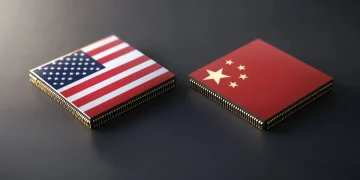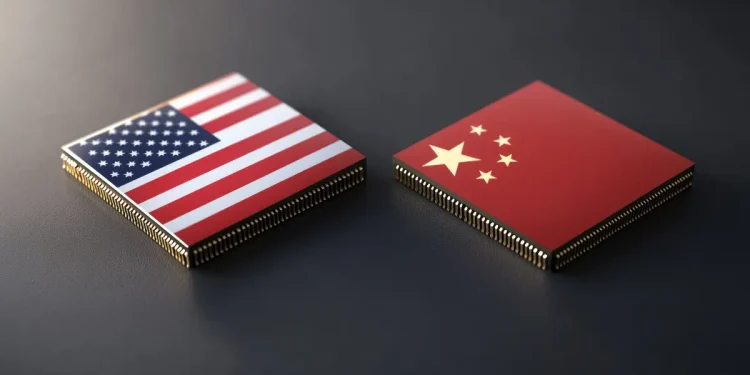By Maria Kalamatas | The Logistic News
April 17, 2025
Global financial markets reeled on Wednesday as President Donald Trump’s administration introduced a fresh round of export restrictions on advanced semiconductor technologies to China, sending shockwaves through the tech industry and triggering a broad selloff across equities, currencies, and commodities.
The most immediate casualty of the move was Nvidia, which announced that the new restrictions could cost the company up to $5.5 billion in revenue this fiscal year due to the loss of its Chinese AI chip market.
“We are adjusting our forecasts and global strategy in real time,” said an Nvidia spokesperson. “China represented a substantial share of our AI and data center revenues.”
Wall Street and Global Stocks in Retreat
The announcement prompted a sharp retreat in U.S., Asian, and European stock markets. The S&P 500 fell 2.4%, while the Nasdaq dropped over 3%, driven by declines in semiconductor and tech shares. In Asia, the Hang Seng Tech Index plunged 4.1%, and the Nikkei 225 in Tokyo closed 1.8% lower.
Meanwhile, the U.S. dollar weakened, as investors sought refuge in gold and government bonds amid rising concerns over global trade fragmentation and tech decoupling.
“The market isn’t just reacting to Nvidia’s numbers—it’s pricing in a longer-term rift between the two largest tech economies,” said Laura Brooks, Senior Economist at Atrium Global Capital.
WTO Issues Dire Warning
The World Trade Organization (WTO) added fuel to the fire by releasing a revised global trade forecast, now expecting a -0.2% contraction in trade volume for 2025, down sharply from its previous +2.7% growth projection issued in January.
“If this trend continues, we risk undoing a decade’s worth of trade integration in critical sectors such as technology and electronics,” said Ngozi Okonjo-Iweala, WTO Director-General, during a press briefing in Geneva.
The WTO attributed the downgrade directly to “a rising wave of export controls, retaliatory tariffs, and collapsing trust between major trade blocs.”
Strategic Supply Chain Disruptions Loom
The tightened restrictions are already prompting logistics reshuffling across key global trade routes. Freight forwarders specializing in high-value cargo such as chipsets, AI processors, and servers are revising shipment protocols, warehousing allocations, and customs documentation practices.
In the long term, supply chains may undergo geographical rerouting and reinvestment in local chip fabrication, particularly in the U.S., Japan, and India—markets seen as safer for long-term semiconductor manufacturing.
“We’re seeing a race to decouple supply chains from China—not just politically, but physically,” said Anuj Rao, Chief Strategy Officer at Falcon Freight Networks.
Conclusion
The new U.S. restrictions on chip exports to China represent more than a policy shift—they signal the deepening of a technological cold war with global implications. For now, markets are nervous, trade is slowing, and logistics planners are bracing for what could be a long and costly recalibration of the world’s most critical supply chains.
Maria Kalamatas is an international economics editor at The Logistic News. She writes on trade, emerging technologies, and global markets.























